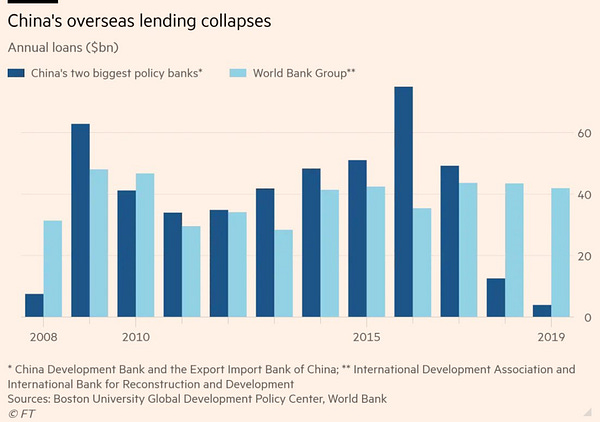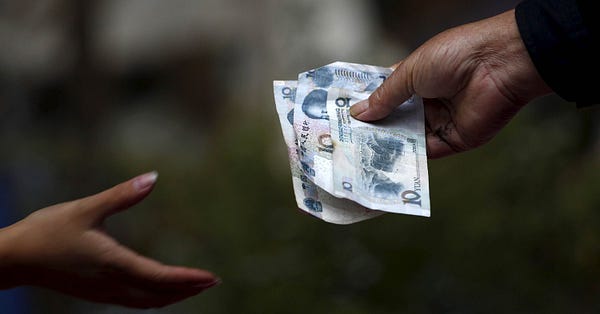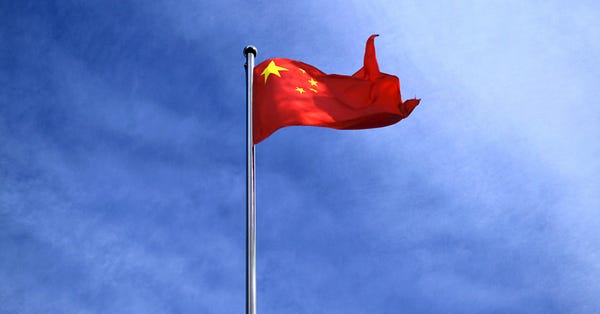Welcome to Newsletter 49 of Trade War.
Starting with some disturbing news, China has detained a Bloomberg News staffer on ‘national security’ grounds, someone I know well and have huge respect for, from my time in Beijing. Under its present leadership, China is a becoming an increasingly hostile place for the press to operate in; this terrible news is one example.
President-elect Biden reportedly is considering nominating Pete Buttigieg, former Democratic rival for the presidency, as U.S. Ambassador to China. And Taiwanese-American trade expert Katherine Tai is a top candidate for USTR.
The Chinese Communist Party continues to clamp down tighter on private business and sharp inequality plus a lack of social mobility, are concerns for China’s leadership.
China detains Bloomberg news staffer on ‘national security’ grounds
Deeply disturbing news out of China: one of my former colleagues has been detained on ‘national security’ grounds. I worked with Haze Fan in my last years at Bloomberg in Beijing and she was one of the most driven, most conscientious - and most generous - news folks around. (I thank her in my book for being such a great colleague and it is deeply deserved.) This alarming news about Haze needs all the attention it can get.


Ambassador Buttigieg for China?
Axios is reporting that Pete Buttigieg could be appointed by president-elect Biden as the next U.S. Ambassador to China. “Letting him deepen his foreign policy chops could boost Buttigieg's future, since many inside the Democratic Party believe his return as a presidential candidate,” Axios writes.
Sharp, calm, clear-eyed..
He would be “great: sharp, calm, [and] clear-eyed on the challenge,” tweets MacroPoloChina’s Matt Sheehan, who, with his colleague Holly He, did a short interview with Buttigieg where they asked him about China and trade early this year.


You’ll waste away…
Jorge Guajardo, a former Mexican Ambassador to China, has a different take. His advice to Buttigieg: take Australia as a diplomatic posting, instead. “That’s where the US will stand up to China, and demonstrate to its lies that it’s a worthy partner,” he tweets.
“In China you’ll waste away and no one will see you. All done through capitals, not embassies,” he writes, referring to the fact that the US-China relationship is mediated through Washington-based senior officials and those in Beijing - not the ambassador on the ground.


Mandarin-speaking USTR?
Biden may choose a Mandarin-speaking, former China enforcement head at the U.S. Office of the Trade Representative, as the agency’s new director. Katherine Tai, the daughter of Taiwanese immigrants to the US. and a Harvard Law School graduate, “can help the US confront Beijing on issues like forced labour and intellectual property rights while preserving a functioning trade relationship between the world’s two largest economies,” reports the the South China Morning Post.
“Lawmakers in both chambers were impressed by Tai’s handling of the negotiations in Congress with the Trump administration over changes sought to the US-Mexico-Canada deal that replaced Nafta,” the Hong Kong-based paper writes.
“She not only brings trade expertise to the job, but an ability to problem solve with all sides of the political spectrum,” tweets Wendy Cutler, a former U.S. trade negotiator. “Those skills will be needed as we navigate a post-Trump trade policy.

Failure borne of ‘America First’ intransigence
Focusing on the key state of Washington, long one of the biggest state-level trading partners with China , two lawyers with deep experience representing American companies in China, lay out why they think the trade war has been a bust; instead, they advocate the U.S. take a multilateral approach.
In 2019, the export of Washington products hit by China’s retaliatory tariffs —including wheat, lumber, and ultrasound equipment - fell by 23% - or almost a quarter - compared to the year before, write Amy L. Sommers and Michael Burke in the Seattle Times. The Trump policy is “a failure born of an “America First” intransigence that ignored our friends and didn’t leverage them into the broader coalition necessary to address a changing China.”
“A multilateral approach promises to untangle the knot that sits at the center of the tangled ball of Trump’s China policy: Countries falling into line with the U.S. risked being hung out to dry when China retaliates. The Biden administration would understand that effective policy requires weaving together a consensus to tackle this China challenge.”


‘Admiring the problem’
Here is an interesting tweet thread by Stanford professor and former U.S. Ambassador to Russia, on the Trump team’s approach to China. As Michael McFaul writes, Trump and co. have done a good job at recognizing the problems in the relationship, but have not come up with ways to solve them.
“I applaud the Trump administration diagnosis of the China challenge. The 2017 National Security Strategy rightly focused on great power competition -- China and Russia -- as needing more attention,” McFaul writes. “But how many times can we keep "admiring the problem" without following up with bold policy responses commensurate [to] the size of the challenge?”
“If this moment [is] really the beginning of Cold War 2.0 as Trump, Pompeo, et al claim, then why have not they organized a Bretton Woods 2.0? A Marshall Plan 2.0 to compete with the PRC's BRI, AIIB. etc? Where is the NATO 2.0 in Asia? Why did they pull out of TPP?”

Private business: must follow the party
China’s powerful leader Xi Jinping is curbing the power of private businesses and increasingly expects them to follow the dictates of the Chinese Communist Party, reports the Wall Street Journal’s Lingling Wei.
“The government is installing more Communist Party officials inside private firms, starving some of credit and demanding executives tailor their businesses to achieve state goals,” Wei writes.
“The view that state planners are better at running a complex economy has gained currency this year, with Beijing relying heavily on state directives to engineer a V-shaped recovery from the shock of Covid-19.”


China lags US, Russia, most of Europe, in social mobility
Growing inequality marked by a lack of social mobility is a growing concern for the leadership in China, reports Bloomberg News.
China only ranks 45th out of 82 countries, below the U.S., Russia and most of Europe, in social mobility, according to a new World Economic Forum index; China’s 5.8 million millionaires and 21,100 residents with wealth above $50 million as of the end of last year, puts it second only to the U.S.
“A 2018 report by the Organisation for Economic Co-operation and Development found that it would take seven generations for someone born into the bottom 10% in China to approach mean income, compared with five in South Korea and four in Japan,” Bloomberg reports.

Notable/In Depth
China “does not have to do particularly well to catch up with the U.S. in terms of overall GDP, since it has four times as many people,” writes David Dollar, the former U.S. Treasury rep in China.


China’s aircraft stuck on runway
While China is on a path to becoming a high-tech superpower in many industries, that’s not the case for its commercial aircraft business. Check out this short video put together by CSIS’ Scott Kennedy on China’s travails in its goal of creating a rival to Airbus and Boeing.


China may have talked big about its Belt and Road Initiative, but recently overseas lending has fallen off a cliff, reports the Financial Times.


Purchasing power parity may be a popular alternate measure of economic strength because it removes market exchange distortions, but it also doesn’t count productivity, and that’s a problem, points out a report by the Peterson Institute for International Economics.


Upcoming speaking
China's global push for influence online - in Taiwan, Hong Kong and the U.S. Please tune in to this timely discussion I am joining on December 17. You can register here.


And recent speaking..
In case you missed it, here is the video of my recent conversation at the Commonwealth Club of California with acclaimed China author Mei Fong, about how demography, inequality, and stalled reforms are holding back China's economic future.


